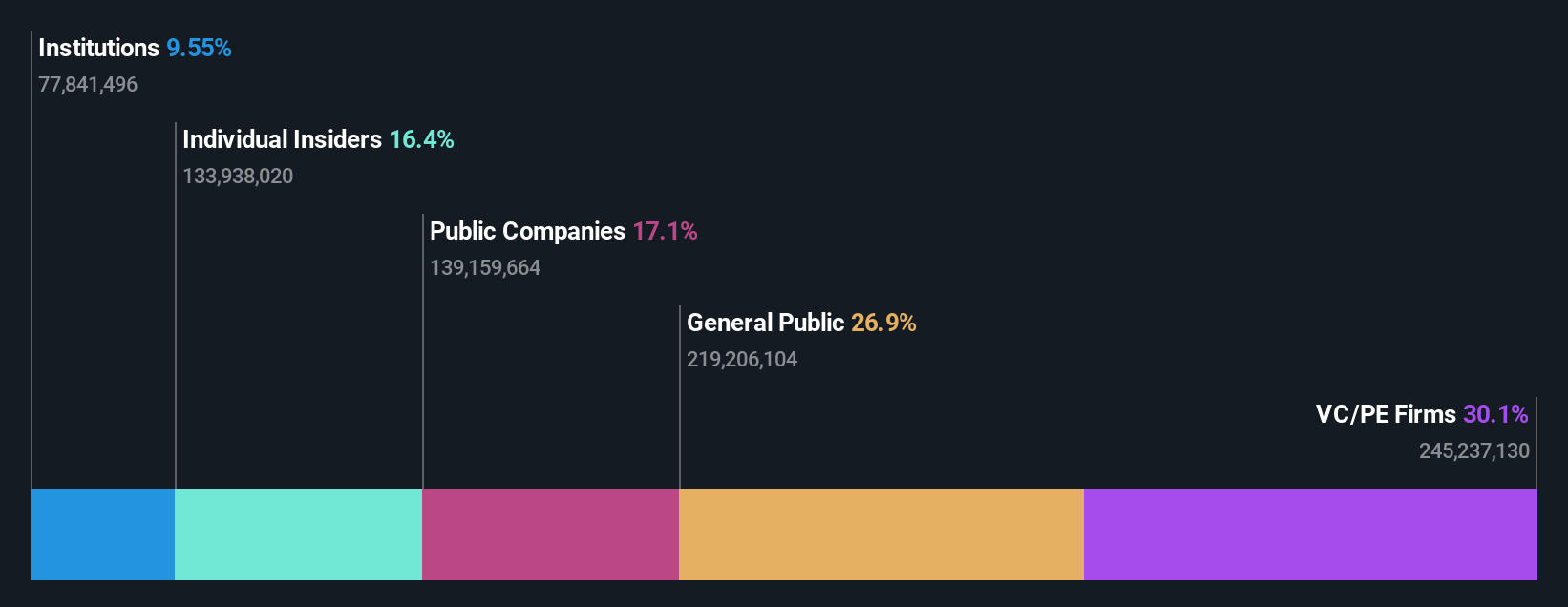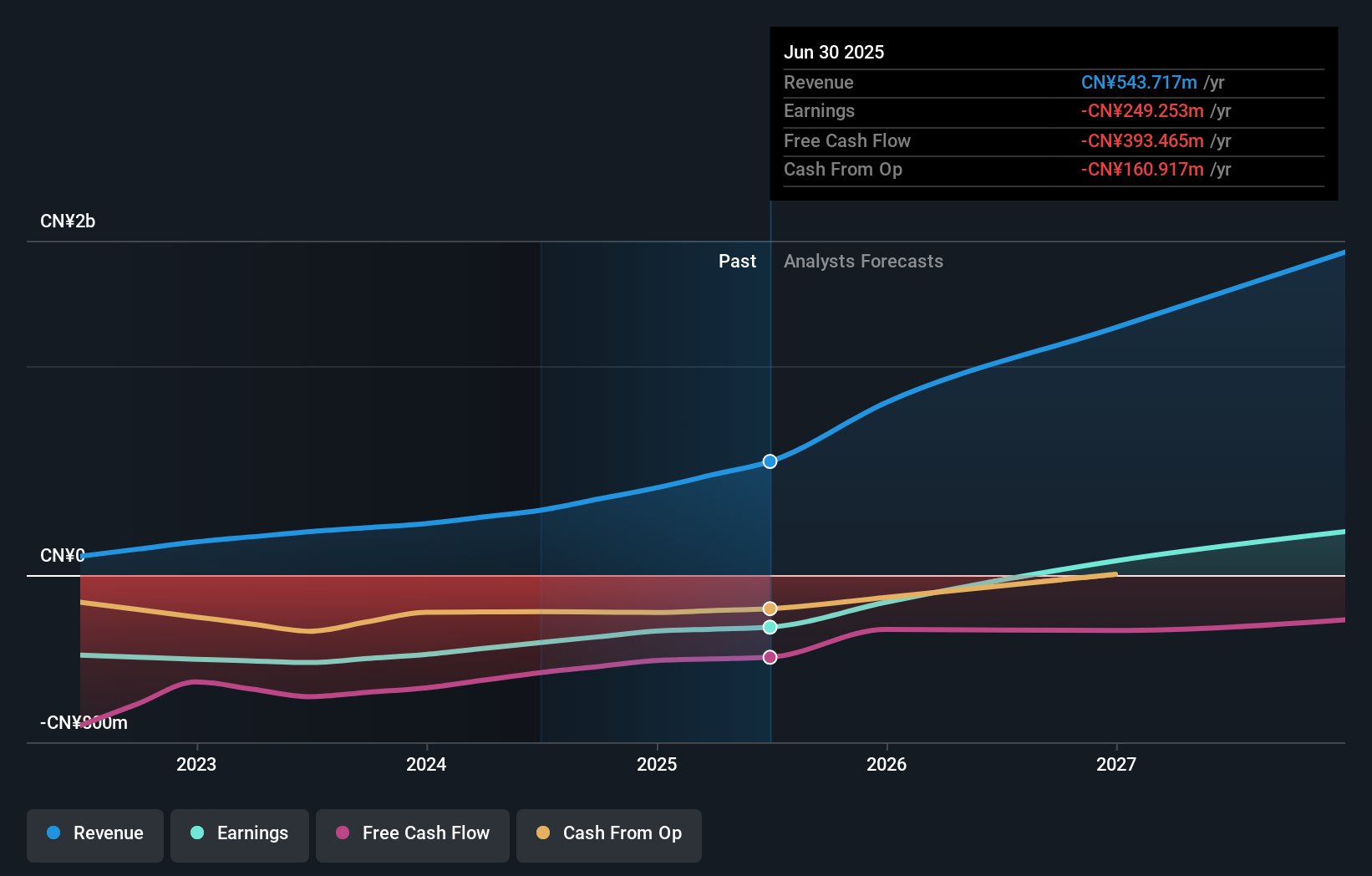Private equity firms among Ocumension Therapeutics' (HKG:1477) largest stockholders and were hit after last week's 5.8% price drop
Key Insights
- Significant control over Ocumension Therapeutics by private equity firms implies that the general public has more power to influence management and governance-related decisions
- A total of 4 investors have a majority stake in the company with 53% ownership
- Insider ownership in Ocumension Therapeutics is 16%
To get a sense of who is truly in control of Ocumension Therapeutics (HKG:1477), it is important to understand the ownership structure of the business. And the group that holds the biggest piece of the pie are private equity firms with 30% ownership. That is, the group stands to benefit the most if the stock rises (or lose the most if there is a downturn).
And following last week's 5.8% decline in share price, private equity firms suffered the most losses.
Let's delve deeper into each type of owner of Ocumension Therapeutics, beginning with the chart below.
View our latest analysis for Ocumension Therapeutics

What Does The Institutional Ownership Tell Us About Ocumension Therapeutics?
Many institutions measure their performance against an index that approximates the local market. So they usually pay more attention to companies that are included in major indices.
Ocumension Therapeutics already has institutions on the share registry. Indeed, they own a respectable stake in the company. This suggests some credibility amongst professional investors. But we can't rely on that fact alone since institutions make bad investments sometimes, just like everyone does. It is not uncommon to see a big share price drop if two large institutional investors try to sell out of a stock at the same time. So it is worth checking the past earnings trajectory of Ocumension Therapeutics, (below). Of course, keep in mind that there are other factors to consider, too.

Ocumension Therapeutics is not owned by hedge funds. Our data shows that Alcon Inc. is the largest shareholder with 17% of shares outstanding. Meanwhile, the second and third largest shareholders, hold 15% and 11%, of the shares outstanding, respectively. Lian Yong Chen, who is the third-largest shareholder, also happens to hold the title of Chairman of the Board. In addition, we found that Ye Liu, the CEO has 5.0% of the shares allocated to their name.
On looking further, we found that 53% of the shares are owned by the top 4 shareholders. In other words, these shareholders have a meaningful say in the decisions of the company.
Researching institutional ownership is a good way to gauge and filter a stock's expected performance. The same can be achieved by studying analyst sentiments. There is a little analyst coverage of the stock, but not much. So there is room for it to gain more coverage.
Insider Ownership Of Ocumension Therapeutics
The definition of an insider can differ slightly between different countries, but members of the board of directors always count. Company management run the business, but the CEO will answer to the board, even if he or she is a member of it.
Most consider insider ownership a positive because it can indicate the board is well aligned with other shareholders. However, on some occasions too much power is concentrated within this group.
Our information suggests that insiders maintain a significant holding in Ocumension Therapeutics. It has a market capitalization of just HK$6.6b, and insiders have HK$1.1b worth of shares in their own names. It is great to see insiders so invested in the business. It might be worth checking if those insiders have been buying recently.
General Public Ownership
The general public-- including retail investors -- own 27% stake in the company, and hence can't easily be ignored. While this size of ownership may not be enough to sway a policy decision in their favour, they can still make a collective impact on company policies.
Private Equity Ownership
With an ownership of 30%, private equity firms are in a position to play a role in shaping corporate strategy with a focus on value creation. Some might like this, because private equity are sometimes activists who hold management accountable. But other times, private equity is selling out, having taking the company public.
Public Company Ownership
We can see that public companies hold 17% of the Ocumension Therapeutics shares on issue. It's hard to say for sure but this suggests they have entwined business interests. This might be a strategic stake, so it's worth watching this space for changes in ownership.
Next Steps:
It's always worth thinking about the different groups who own shares in a company. But to understand Ocumension Therapeutics better, we need to consider many other factors.
I like to dive deeper into how a company has performed in the past. You can find historic revenue and earnings in this detailed graph.
If you would prefer discover what analysts are predicting in terms of future growth, do not miss this free report on analyst forecasts.
NB: Figures in this article are calculated using data from the last twelve months, which refer to the 12-month period ending on the last date of the month the financial statement is dated. This may not be consistent with full year annual report figures.
New: AI Stock Screener & Alerts
Our new AI Stock Screener scans the market every day to uncover opportunities.
• Dividend Powerhouses (3%+ Yield)
• Undervalued Small Caps with Insider Buying
• High growth Tech and AI Companies
Or build your own from over 50 metrics.
Have feedback on this article? Concerned about the content? Get in touch with us directly. Alternatively, email editorial-team (at) simplywallst.com.
This article by Simply Wall St is general in nature. We provide commentary based on historical data and analyst forecasts only using an unbiased methodology and our articles are not intended to be financial advice. It does not constitute a recommendation to buy or sell any stock, and does not take account of your objectives, or your financial situation. We aim to bring you long-term focused analysis driven by fundamental data. Note that our analysis may not factor in the latest price-sensitive company announcements or qualitative material. Simply Wall St has no position in any stocks mentioned.
About SEHK:1477
Ocumension Therapeutics
Operates as an ophthalmic pharmaceutical platform company in the People's Republic of China.
Flawless balance sheet with high growth potential.
Market Insights
Community Narratives



